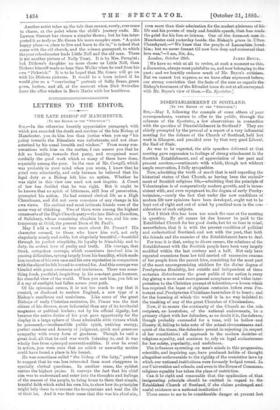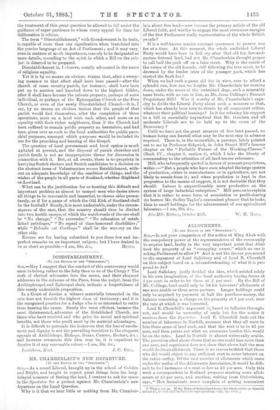DISESTA_BLISHMENT iN SCO'PLAND.
[To THE EDITOR OF THE " SPECTA.TOR.".1
STE,—May I, following the example of some others of your correspondents, venture to offer to the public, through, the columns of the Spectator, a few observations in connection with the question of Dieestablishment in Scotland ? They, are chiefly prompted by the -perusal of a report of a very influential meeting for the defence of the Church of Scotland; held last- week in Glasgow, and presided over by that very good Liberal, the Earl of-Stair.
As was to be expected, the able speeches delivered at that meeting gave expression to feelings of strong attachment to the Scottish Establishment, and of appreciation of her past and present servites,—sentiments with which; though not -without ample reservation, I fully sympathise.
New,-admitting the truth of much' that is said regarding the historical status of that Church, as having been the embodie- ment of Scottish religious life,—admitting that the principle of Voluntaryism is of comparatively modern growth; and is incon- sistent with, and even repugnant to, the dogma of early' Presby- terianism,—surely the fact that under the new conditions -of modern life new -opinions 'have been developed, oughtmot to be-' kept out of right-and out of mind by practical men in the con- • sideration of such-subjects.
Yet I think this has been too much the case at the. meeting in question. By all. means let due honour be paid to the Established Church for her good deeds,but-let us bear in mind, nevertheless, that it is with the present condition of political and ecclesiastical Scotland, and not with the past, that both the friends and the enemies of the Establislanient have to deal.
Fo'r true it is that, owing to divers causes, the relations of the Establishment with the Scottish people have been very-largely modified within the last century and a half. Not only have repeated secessions from her fold carried off -successive swarms of her people from the parent hive, consisting for the most part of the most uncompromising sticklers for the divine doginnof Presbyterian Headship, but outside and independent of these sectarian disturbances the great public of the nation is every daygieing a more and, moregeneral acceptance and wider.inter- pretation to the Christian precept of toleration,—a lesson which has required, ,the lapse of eighteen centuries :before even Pro- testant and Presbyterian. Chrietiansliavetakee-it to heart;. and for the learaingaof which the workl- is in--no. way indebted to, the. teaching of any of the great Churches of Chriatendosn.
Now; if to secure the continuity of the. Church, -as- the sole recipieuta.as, heretofore, of the methanol: endowments, be.: a primary object with_her defenders, as no doubt it is, thedefence„- though: probably successful for a time, will be hollowand, illusory if,. failing to takemote of the actaalcircumatanceaand, spirit of,_the.tirnes,,thedefenders persist intrejeeting (inreapeet _ of_ her constitution) all. approach to the modern doctrine of religious equality, and continue to, rely on..legal, exclusistene.se for.: hersafety, popularity, and usefulnesn., The influences operating on meigs minds in this progressiv.ei scientifiepand inquiring, age, have produced, habits. of thought altogethen unfavourable to the rigidity of the restrictive laws by • which, our nationaLinatitutionswere formerly hedged round.. In, ourUniversities and schools, and even in theHouseof Conamons religious equality has taken the place.of restriction.
Can it be right and reasonable that the, application of .that invigorating principle. should, be omitted in regard. to.. the Established...Church of Scotland, if she claims prolonged,,and useful existence as a national institution ?
There seems to me to be -considerabLe..danger at present lest
the treatment of this great question be allowed to fall under the guidance of eager partisans to whom every appeal for time for deliberation is odious.
The term " Disestablishment," with disendowment in its train, is capable of more than one signification when translated into the precise language of an Act of Parliament ; and it may vary, even, in matters of much importance, scarcely to be designated as mere details, according to the spirit in which a Bill on the sub- ject, is directed to be prepared.
Disestablishment is, I observe, usually advocated in the name of religious equality.
Yet it is by no means an obvious truism that, after a sweep- ing measure to that effect shall have been passed—after-the church of some country parish, for instance, shall have been put up to auction and knocked down to the highest bidder, after it shall have become the private property, perhaps of some individual, or perhaps of the Episcopalian Church or the Free Church, or even of the newly Disestablished Church—it is, I say, by no means an obvious truism that the people of that parish would find themselves, after the completion of these operations, more on a level with each other, and more on an equality with their richer neighbours, than if the Church had been suffered to remain public property as heretofore, and had been given over as such to the local authorities for public paro- chial purposes, amongst which purposes would be included its use for the preaching and -hearing of the Gospel.
The question of local government and local option is much agitated at present, and the disposal of parish churches and parish funds is not an inappropriate theme for discussion in connection with it. -But, at all events, there is no propriety in hurrying Scotch electors and' Scotch candidates to a decision on the abstract issue of Voluntaryism versus Establishment, with- out au adequate knowledge of the condition of things, and-the wishes of the people in all parts of ,Sootlandi.whether Highland .er.Lowland.
"-What can be the justification for so-treating this difficult and important problem-as almost to ,corapel.men who desire above all things to be reasonable and impartial, to choose sides prema- turely, as if for a game of which the Old Kirk of -Scotland shall be the football P Surely, it is most undesirable, under the circum- stances of the case, that the country should .thus be divided into two hostile camps, of which the watchwords of the one shall be "No change," " No surrender," "No relaxation of estab- lished privileges," "No repeal of time-honoured disabilities ;" while "Delenda -eel Carthago" shall be the war-cry on the other side.
Excuse one for having submitted to you these few and im- perfect remarks on an important subject; but I have desired to -be as short as possible.—I am, Sir, &c., MINT°.







































 Previous page
Previous page